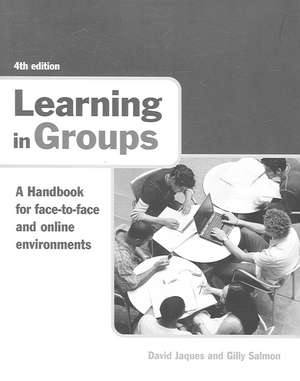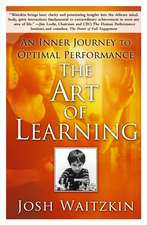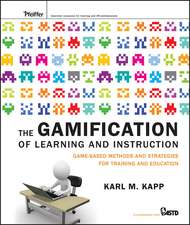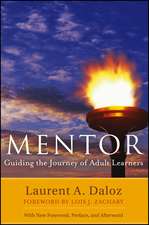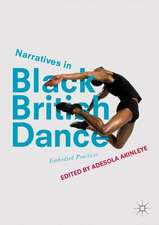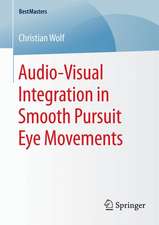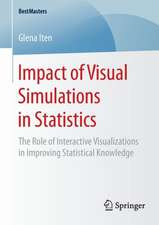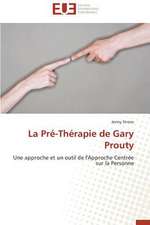Learning in Groups: A Handbook for Face-to-Face and Online Environments
Autor David Jaques, Gilly Salmonen Limba Engleză Paperback – 21 dec 2006
This handbook is a truly comprehensive guide for anyone involved in groupwork, containing advice and practical exercises to develop group learning skills for both learners and tutors. This new edition has been thoroughly updated, containing valuable new material throughout on group learning and collaborating online, action research and the role of reflection and emotional intelligence.
| Toate formatele și edițiile | Preț | Express |
|---|---|---|
| Paperback (1) | 314.23 lei 6-8 săpt. | |
| Taylor & Francis – 21 dec 2006 | 314.23 lei 6-8 săpt. | |
| Hardback (1) | 1489.86 lei 6-8 săpt. | |
| Taylor & Francis – 11 ian 2007 | 1489.86 lei 6-8 săpt. |
Preț: 314.23 lei
Nou
Puncte Express: 471
Preț estimativ în valută:
60.13€ • 65.30$ • 50.51£
60.13€ • 65.30$ • 50.51£
Carte tipărită la comandă
Livrare economică 22 aprilie-06 mai
Preluare comenzi: 021 569.72.76
Specificații
ISBN-13: 9780415365260
ISBN-10: 0415365260
Pagini: 358
Ilustrații: 62 Line drawings, black and white
Dimensiuni: 189 x 246 x 27 mm
Greutate: 0.72 kg
Ediția:Revizuită
Editura: Taylor & Francis
Colecția Routledge
Locul publicării:Oxford, United Kingdom
ISBN-10: 0415365260
Pagini: 358
Ilustrații: 62 Line drawings, black and white
Dimensiuni: 189 x 246 x 27 mm
Greutate: 0.72 kg
Ediția:Revizuită
Editura: Taylor & Francis
Colecția Routledge
Locul publicării:Oxford, United Kingdom
Public țintă
Academic, Professional, and Professional Practice & DevelopmentCuprins
Principles of Group Dynamics. Studies of Group Behaviour. Approaches to Learning. Communicating in Groups. Aims and Purposes of Groups. Group Activities. The Role of Tutor and E-Moderator. Learning Groups in Context. Assessing and Evaluating with Groups
Recenzii
'This is a truly excellent book. With a solid theoretical underpinning, it is wide-ranging, accessible, practical and, above all, useful...Whatever your role, if you want to enable groups to function and learn well, read and use this book!' - Bob Rotheram, Leeds Metropolitan University, UK
'What a great book! One of the all-time great writers on small group work joins forces with the queen of online learning. This book is readable, theoretically rigorous, practical, and excellently presented.' - Trish Greenhalgh, University College London, UK
'The book progresses well from the theoretical underpinning of group behaviour to assessment within groups and pratcial check lists for leaders. The online learning points are well integrated and not viewed as add-ons. In its general framework, the book is extremely coherent with excellent use of bullet points, diagrams, tables and shading to encourage clarity of thought.' - British Journal of Educational Technology
This is a truly excellent book. With a solid theoretical underpinning, it is wide-ranging, accessible, practical and, above all, useful. Some of the material is mature and well-tried, familiar from when I was learning to be a groupworker. But there is content for the 21st century too, especially in the area of online learning. Here, Gilly Salmon draws on her expertise with ‘e-moderating’ and ‘e-tivities’, serving up a rich diet for anyone wanting to move (further) into offering blended learning. A huge number of ideas are provided, and a chapter of ten case studies shows how others ‘did it’ in a wide variety of settings.
Whatever your role, if you want to enable groups to function and learn well, read and use this book!
Bob Rotheram
National Teaching Fellow, Reader in Assessment, Learning and Teaching
Leeds Metropolitan University
What a great book! One of the all-time great writers on small group work joins forces with the queen of online learning. This book is readable, theoretically rigorous, practical, and excellently presented. Trish Greenhalgh
Trish Greenhalgh
Professor of Primary Health Care
University College London
"Learning in groups" is both readable and practical. Concepts are clearly explained, illustrated and backed up by research studies and years of experience. I found myself saying "Yes, I totally agree!" on almost every page, and making a note to recommend several chapters to colleagues. Exploration of the subtle and significant differences that arise with online approaches is included where relevant and encourages considered thought.
In preparation for running a communication skills workshop, I found helpful tips and guidance for creating an effective and "safe" learning environment. As I put a seminar together on small group learning for lecturers, I wanted to condense the book into a single slide. I wholeheartedly recommend this book to anyone wanting to get the most out of groups and their learning.
Kim Whittlestone, Senior Lecturer in Independent Learning, LIVE Centre, Royal Veterinary College, Hatfield
I encountered the first edition of this book in 1986, at the outset of my career working with groups. It helped shape and guide both my understanding and practice then, and this new fourth edition does not disappoint. It has a fresh style, and radically updated content (e-moderation, contemporary case studies), whilst staying faithful to the accessible, practical character I valued then. This should become a 'standard work' for practitioners using groups as a vehicle for learning - it's a comprehensive overview, and also acts as a resource of exercises and ideas.
Andy Gill
Lead Consultant - People in Organisations
I find it impossible to imagine than any lecturer, tutor or teacher need look any further for sound advice and guidance about how to help people learn effectively in groups. This book is impressively comprehensive, not only about group processes but also about the whole business of learning - including eLearning in all its forms. If lecturers fail to heed the wisdom in this book, the answer could be to empower every student/learner by giving them a copy of the book; a constructive move if we are serious about helping people take responsibility for their own learning.
Peter Honey, chartered psychologist and founder of Peter Honey Publications Ltd.
While reading this book, I kept making separate "to do" notes for my various groups: student groups in my courses, faculty-developer groups, governing boards, and a nation-wide grant team that meets online. This book is the most thorough analysis of learning in groups I have read in 30 years. With descriptive vocabulary, meaningful context, and a research base, it is a treasure chest of ready-to-use-or-modify ideas, activities, and strategies to promote, and assess, learning in groups. It naturally integrates throughout precepts and examples for both face-to-face and e-learning environments, providing an honest view of potential disadvantages of some group plans: The project can go radically wrong, p. 154.
With an effective writing style that motivates towards using group work (groups are, potentially at least, the market place for buying into the mores of the course, p. 87), the reader is encouraged to judge the usefulness of specific group activities with the aid of advantages/disadvantages that are listed regarding a suggested practice.
This book benefits those from all tiers of experience with group learning. It is sufficiently thorough for the novice, mercifully concise for the experienced, and up-to-date for the scholar, citing the most recent work of others on such topics as team-based learning, course design, assessment, evaluation, and e-learning in groups.
Dr. Cynthia Desrochers
Consultant in Teaching & Learning,
California State University, Office of the Chancellor
'What a great book! One of the all-time great writers on small group work joins forces with the queen of online learning. This book is readable, theoretically rigorous, practical, and excellently presented.' - Trish Greenhalgh, University College London, UK
'The book progresses well from the theoretical underpinning of group behaviour to assessment within groups and pratcial check lists for leaders. The online learning points are well integrated and not viewed as add-ons. In its general framework, the book is extremely coherent with excellent use of bullet points, diagrams, tables and shading to encourage clarity of thought.' - British Journal of Educational Technology
This is a truly excellent book. With a solid theoretical underpinning, it is wide-ranging, accessible, practical and, above all, useful. Some of the material is mature and well-tried, familiar from when I was learning to be a groupworker. But there is content for the 21st century too, especially in the area of online learning. Here, Gilly Salmon draws on her expertise with ‘e-moderating’ and ‘e-tivities’, serving up a rich diet for anyone wanting to move (further) into offering blended learning. A huge number of ideas are provided, and a chapter of ten case studies shows how others ‘did it’ in a wide variety of settings.
Whatever your role, if you want to enable groups to function and learn well, read and use this book!
Bob Rotheram
National Teaching Fellow, Reader in Assessment, Learning and Teaching
Leeds Metropolitan University
What a great book! One of the all-time great writers on small group work joins forces with the queen of online learning. This book is readable, theoretically rigorous, practical, and excellently presented. Trish Greenhalgh
Trish Greenhalgh
Professor of Primary Health Care
University College London
"Learning in groups" is both readable and practical. Concepts are clearly explained, illustrated and backed up by research studies and years of experience. I found myself saying "Yes, I totally agree!" on almost every page, and making a note to recommend several chapters to colleagues. Exploration of the subtle and significant differences that arise with online approaches is included where relevant and encourages considered thought.
In preparation for running a communication skills workshop, I found helpful tips and guidance for creating an effective and "safe" learning environment. As I put a seminar together on small group learning for lecturers, I wanted to condense the book into a single slide. I wholeheartedly recommend this book to anyone wanting to get the most out of groups and their learning.
Kim Whittlestone, Senior Lecturer in Independent Learning, LIVE Centre, Royal Veterinary College, Hatfield
I encountered the first edition of this book in 1986, at the outset of my career working with groups. It helped shape and guide both my understanding and practice then, and this new fourth edition does not disappoint. It has a fresh style, and radically updated content (e-moderation, contemporary case studies), whilst staying faithful to the accessible, practical character I valued then. This should become a 'standard work' for practitioners using groups as a vehicle for learning - it's a comprehensive overview, and also acts as a resource of exercises and ideas.
Andy Gill
Lead Consultant - People in Organisations
I find it impossible to imagine than any lecturer, tutor or teacher need look any further for sound advice and guidance about how to help people learn effectively in groups. This book is impressively comprehensive, not only about group processes but also about the whole business of learning - including eLearning in all its forms. If lecturers fail to heed the wisdom in this book, the answer could be to empower every student/learner by giving them a copy of the book; a constructive move if we are serious about helping people take responsibility for their own learning.
Peter Honey, chartered psychologist and founder of Peter Honey Publications Ltd.
While reading this book, I kept making separate "to do" notes for my various groups: student groups in my courses, faculty-developer groups, governing boards, and a nation-wide grant team that meets online. This book is the most thorough analysis of learning in groups I have read in 30 years. With descriptive vocabulary, meaningful context, and a research base, it is a treasure chest of ready-to-use-or-modify ideas, activities, and strategies to promote, and assess, learning in groups. It naturally integrates throughout precepts and examples for both face-to-face and e-learning environments, providing an honest view of potential disadvantages of some group plans: The project can go radically wrong, p. 154.
With an effective writing style that motivates towards using group work (groups are, potentially at least, the market place for buying into the mores of the course, p. 87), the reader is encouraged to judge the usefulness of specific group activities with the aid of advantages/disadvantages that are listed regarding a suggested practice.
This book benefits those from all tiers of experience with group learning. It is sufficiently thorough for the novice, mercifully concise for the experienced, and up-to-date for the scholar, citing the most recent work of others on such topics as team-based learning, course design, assessment, evaluation, and e-learning in groups.
Dr. Cynthia Desrochers
Consultant in Teaching & Learning,
California State University, Office of the Chancellor
Notă biografică
David Jaques is an independent educational and organisational consultant, and an experienced groupwork and teamwork trainer. He was previously Head of the Educational Methods Unit at Oxford Brookes University.
Gilly Salmon is a Professor of E-Learning at the University of Leicester, UK, and is author of a number of best-selling titles, including E-Moderating and E-Tivities. She was awarded a National Teaching Fellowship in 2006.
Gilly Salmon is a Professor of E-Learning at the University of Leicester, UK, and is author of a number of best-selling titles, including E-Moderating and E-Tivities. She was awarded a National Teaching Fellowship in 2006.
Descriere
This handbook is a comprehensive guide for anyone involved in groupwork, with advice and practical exercises to develop group learning skills for learners and tutors. Thoroughly updated with valuable new material throughout on group learning and collaborating online.
